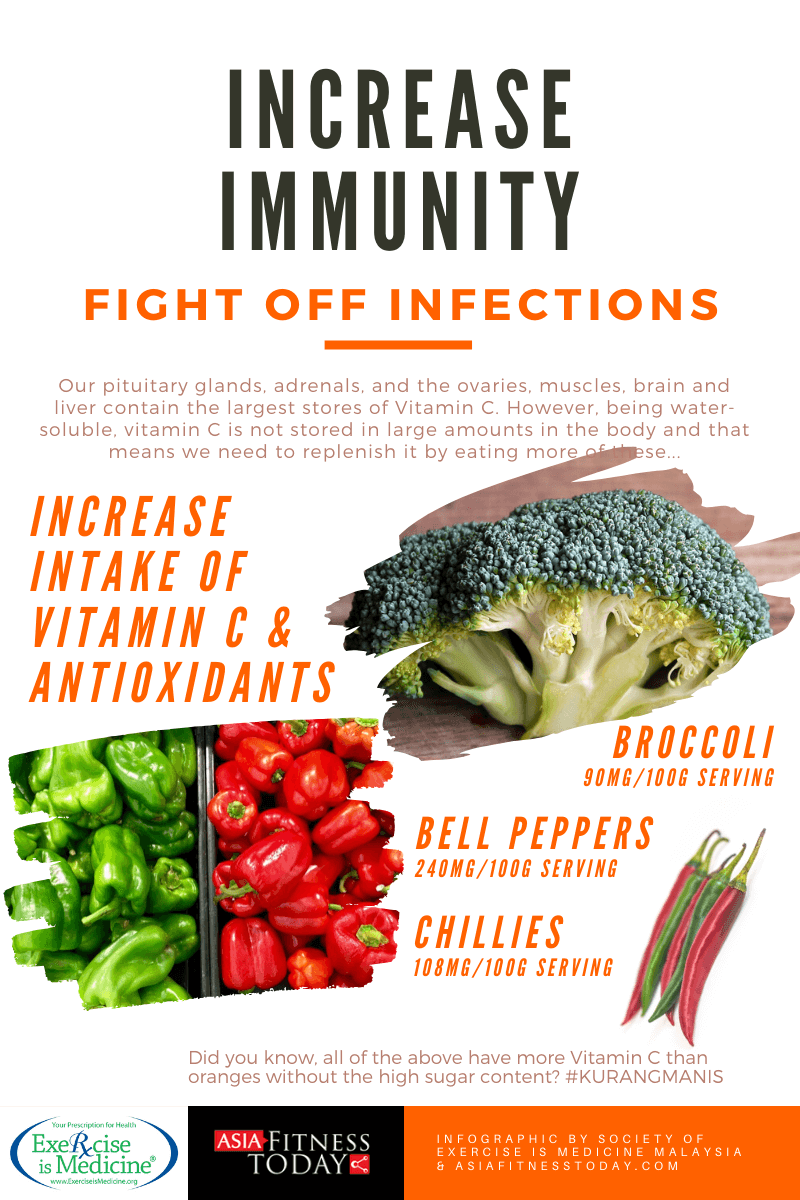I was compiling research on boosting our immune system, and would like to share that it’s far beyond just taking Vitamin C. It’s all about reducing my intake of carbohydrates and getting some Vitamin D of some sunlight kind. It really is as simple as that!
Increasing our immunity help fight off infections. Our pituitary glands, adrenals and the ovaries, muscles, brain and liver contain the largest stores of Vitamin C. However, being water-soluble, Vitamin C is not stored in large amounts in the body and that means we need to replenish it by eating more foods that have anti odixant properties like brocolli, bell peppers and chillies!

Our immune system
During the movement control order (MCO) lockdown, I’ve been sharing some interesting science-based truths about boosting our immune system. Firstly, lets understand the function of our immune system.
How do we ensure our immune system functions well, just like clock work and why is it so important? A healthy immune system is the defence against any attack by pathogenic organism. Our immune system identifies and eliminates pathogens. Our immune system works just like a car alarm system, identifying an intruder who attempts to break into the car and presents a possible threat to the security of the persons sitting inside the car.
The immune system is complex. Sub-optimal immune systems that occur early (in babies) and late in life (in older people) increase the susceptibility of infection for these category of population. So the big question is – how do we boost our immune system?
While staying at home, I found some great research studies and have compiled them below for your reading:
Vitamin C
I’ve heard about many people taking high dosages of Vitamin C during these unprecedented times. We now know that Vitamin C is water soluble, which means it’s not stored in the body. As one of the body’s main antioxidants, Vitamin C is required for collagen synthesis[1], for protection against oxidative stress [2] and immune function [3]. The changes in the way we work and live in the past 100 years, the added modern stress of having phone calls, car honks and other alerts heighten our fight or flight responses on such a high occurence. Couple that with our modern diet that comprises of treats, sweets and it’s no surprise that obesity rates have gone up to unprecedented levels yet there are far more cases of undernutrition and those are big factors in decreased immune defences.
Source: Human Development and Health Academic Unit, Faculty of Medicine, University of Southampton, UK |
[1] Citation: Boyera N, Galey I, Bernard BA. Effect of vitamin C and its derivatives on collagen synthesis and cross-linking by normal human fibroblasts. Int J Cosmet Sci. 1998;20(3):151-158. doi:10.1046/j.1467-2494.1998.171747.x
[2] Citation: Padayatty SJ, Katz A, Wang Y, et al. Vitamin C as an antioxidant: evaluation of its role in disease prevention. J Am Coll Nutr. 2003;22(1):18-35. doi:10.1080/07315724.2003.10719272
[3] Citation: Wintergerst ES, Maggini S, Hornig DH. Immune-enhancing role of vitamin C and zinc and effect on clinical conditions. Ann Nutr Metab. 2006;50(2):85-94. doi:10.1159/000090495
Functional foods
Nutrients that have been demonstrated (in either animal or human studies) to be required for the immune system to function efficiently include essential amino acids, the essential fatty acid linoleic acid, vitamin A, folic acid, vitamin B6, vitamin B12, vitamin C, vitamin E, Zinc (Zn), Copper (Cu), Iron (Fe) and Selenium (Se). Practically all forms of immunity may be affected by deficiencies in one or more of these nutrients. Animal and human studies have demonstrated that adding the deficient nutrient back to the diet can restore immune function and resistance to infection. Among the nutrients studied most in this regard are vitamin E and Zn. Increasing intakes of some nutrients above habitual and recommended levels can enhance some aspects of immune function. However, excess amounts of some nutrients also impair immune function. There is increasing evidence that probiotic bacteria improve host immune function. The effect of enhancing immune function on host resistance to infection in healthy individuals is not clear.
Citation: Calder PC, Kew S. The immune system: a target for functional foods?. Br J Nutr. 2002;88 Suppl 2:S165‐S177. doi:10.1079/BJN2002682
Nutrition
The immune system plays a key role in the body’s ability to fight infection and reduce the risk of developing tumours, autoimmune and degenerative disease. Nutritional deficiencies and excesses influence various components of the immune system. Early studies investigating the association between nutrition and immunity focused on generalised protein-energy malnutrition, particularly in children in developing countries. The extent of immunological impairment depends not only on the severity of malnutrition but on the presence of infection and on the age of onset of nutritional deprivation, among other factors. In industrialised nations, immune function has been shown to be compromised in many malnourished hospitalised patients, small-for-gestational age infants, and the elderly. Obesity also may adversely influence immune function.
Deficiencies of protein and some amino acids, as well as vitamins A, E, B6 and folate, are associated with reduced immunocompetence.
Citation: Chandra S, Chandra RK. Nutrition, immune response, and outcome. Prog Food Nutr Sci. 1986;10(1-2):1‐65.
Sunlight
Acute respiratory infections (ARI), including the common cold causes significant morbidity and economical losses globally. Micronutrient deficiency may increase ARI incidence risk and its associated duration and severity among healthy adults, but evidence are inconclusive (
The literature search identified 423 unique studies. Of which, only eight studies were eligible and included in the final review. Only vitamin D deficiency (VDD) was observed among these eight studies.
Citation: Wang MX, Koh J, Pang J. Association between micronutrient deficiency and acute respiratory infections in healthy adults: a systematic review of observational studies. Nutr J. 2019;18(1):80. Published 2019 Nov 30. doi:10.1186/s12937-019-0507-6
Most memorable of all articles I’ve read is this quote from a renowned neurosurgeon and advocate for sunlight, Dr. Jack Kruse:
Vitamin D3 is just the chemical signal made after unpolarised light is captured by our skin and in the pill form, it does not have the power of the sun’s light or photons. Taking supplemental vitamin D3 is like trying to hire someone else to do your push-ups for you.
Dr. Jack Kruse
So vitamin D is best direct from the sun. Ready for the great outdoors? I can’t wait… Meanwhile, Stay Safe!




Facebook Comments